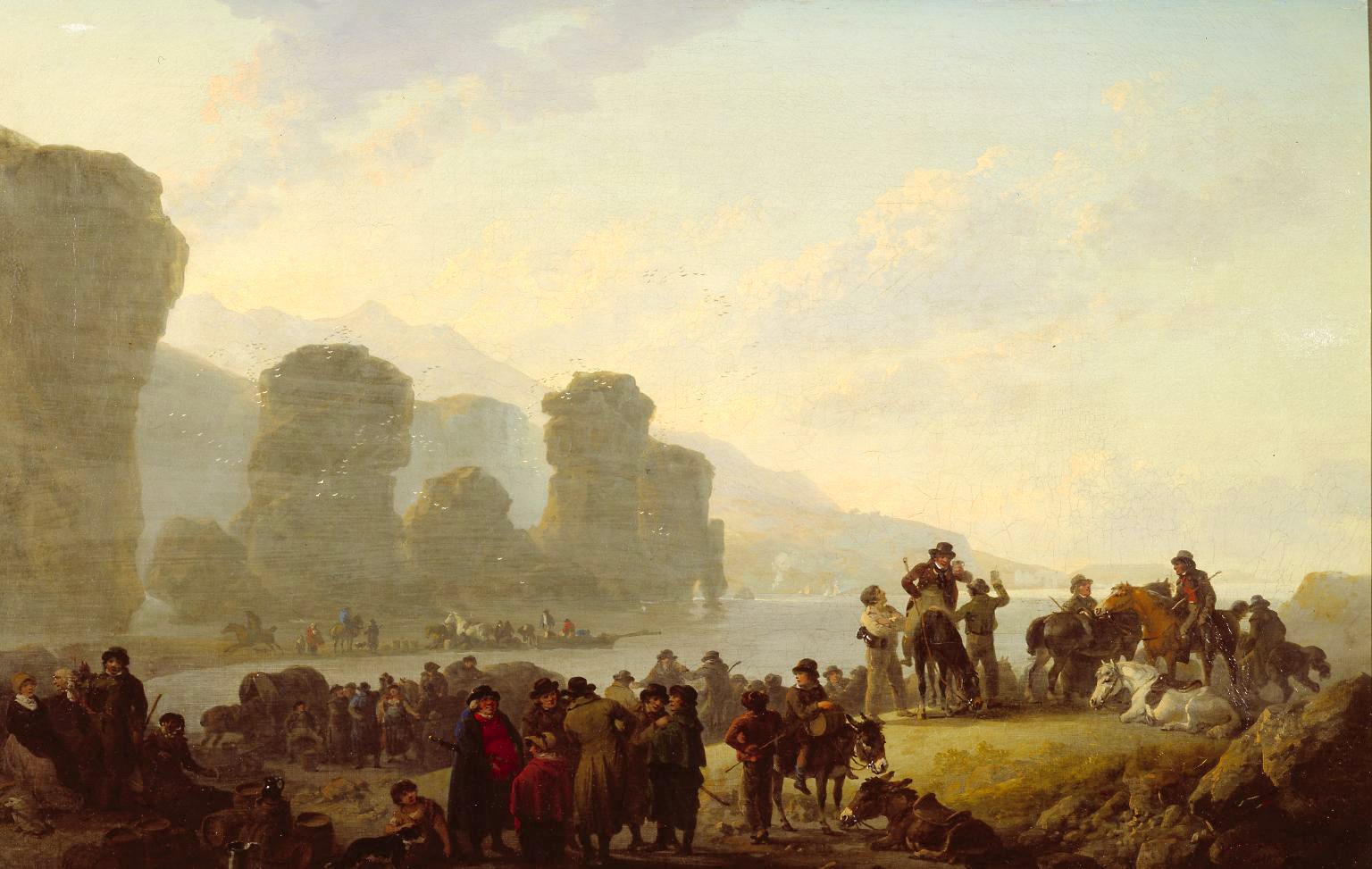Marketplace
A Coast Scene in the Peninsular War
Provenance:
with Dowdeswell & Dowdeswell, 160 New Bond Street, London, before 1917; with The Leger Gallery, Old Bond Street, London, 1948.
Literature:
R.M.Clay, Julius Caesar Ibbetson (1948), p. 50, pl. 102.
Rotha Mary Clay researched and wrote her pioneering book on Ibbetson in arduous circumstances during the Second World War, travelling up and down the country in blacked-out trains, experiencing lengthy delays in correspondence and difficulties in obtaining black and white photographs. Out of respect to her, therefore, I have here retained the traditional title which accompanies the full-page illustration of this painting in her book. However, it is not certain what the exact inspiration was for Ibbetson here, and it may well be that a captured French ship was run aground and its cargo pillaged before the arrival of ‘the authorities’’, as Clay suggests. As early as 1781, however, Ibbetson painted a similar composition with prominent cliffs on the right, and a man addressing a crowd on the foreshore below; the assembly is surrounded by horses and supplies, while other men are busy rowing to or from larger vessels beyond (Rocky Coast Scene, Government Art Coll. GAC6824). This idea of large, possibly not entirely lawful gatherings at a remote coastal spot continues in two other recorded paintings which relate very closely to ours, Flamborough Head, Georgian House, Bristol City Art Gallery) and Smugglers on the Irish Coast, Tate Britain (see below), this latter the same size and same date as ours and almost certainly its pendant.
This lively scene is full of interest for the variety of figures which Ibbetson clearly enjoyed portraying. Even though he was working from an earlier idea as evinced by the existence of a preparatory drawing for this exact composition, seeing the large militia gatherings in the town square at Masham at the height of the Napoleonic invasion threat, as he did, must have rekindled his interest in crowd scenes and all the picaresque characters he had encountered in his travels round Britain - and on his single voyage to the Far East.

with Dowdeswell & Dowdeswell, 160 New Bond Street, London, before 1917; with The Leger Gallery, Old Bond Street, London, 1948.
Literature:
R.M.Clay, Julius Caesar Ibbetson (1948), p. 50, pl. 102.
Rotha Mary Clay researched and wrote her pioneering book on Ibbetson in arduous circumstances during the Second World War, travelling up and down the country in blacked-out trains, experiencing lengthy delays in correspondence and difficulties in obtaining black and white photographs. Out of respect to her, therefore, I have here retained the traditional title which accompanies the full-page illustration of this painting in her book. However, it is not certain what the exact inspiration was for Ibbetson here, and it may well be that a captured French ship was run aground and its cargo pillaged before the arrival of ‘the authorities’’, as Clay suggests. As early as 1781, however, Ibbetson painted a similar composition with prominent cliffs on the right, and a man addressing a crowd on the foreshore below; the assembly is surrounded by horses and supplies, while other men are busy rowing to or from larger vessels beyond (Rocky Coast Scene, Government Art Coll. GAC6824). This idea of large, possibly not entirely lawful gatherings at a remote coastal spot continues in two other recorded paintings which relate very closely to ours, Flamborough Head, Georgian House, Bristol City Art Gallery) and Smugglers on the Irish Coast, Tate Britain (see below), this latter the same size and same date as ours and almost certainly its pendant.
This lively scene is full of interest for the variety of figures which Ibbetson clearly enjoyed portraying. Even though he was working from an earlier idea as evinced by the existence of a preparatory drawing for this exact composition, seeing the large militia gatherings in the town square at Masham at the height of the Napoleonic invasion threat, as he did, must have rekindled his interest in crowd scenes and all the picaresque characters he had encountered in his travels round Britain - and on his single voyage to the Far East.

More artworks from the Gallery









